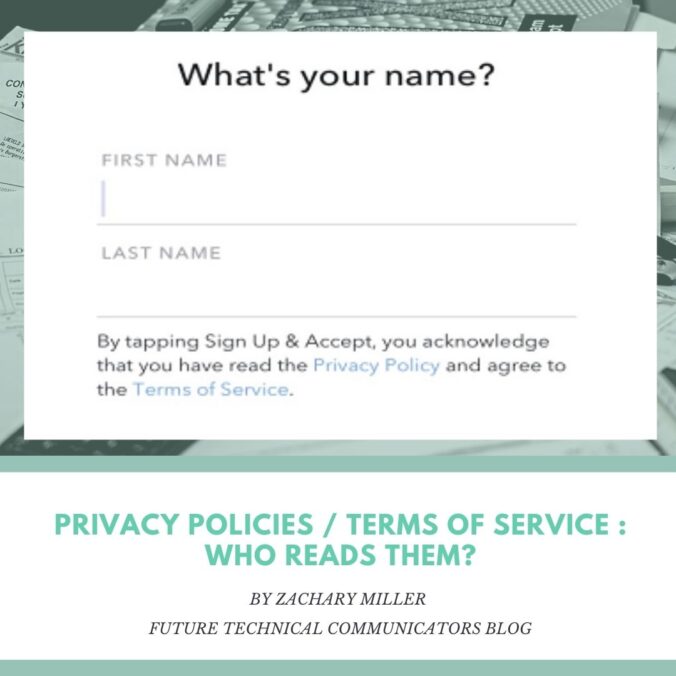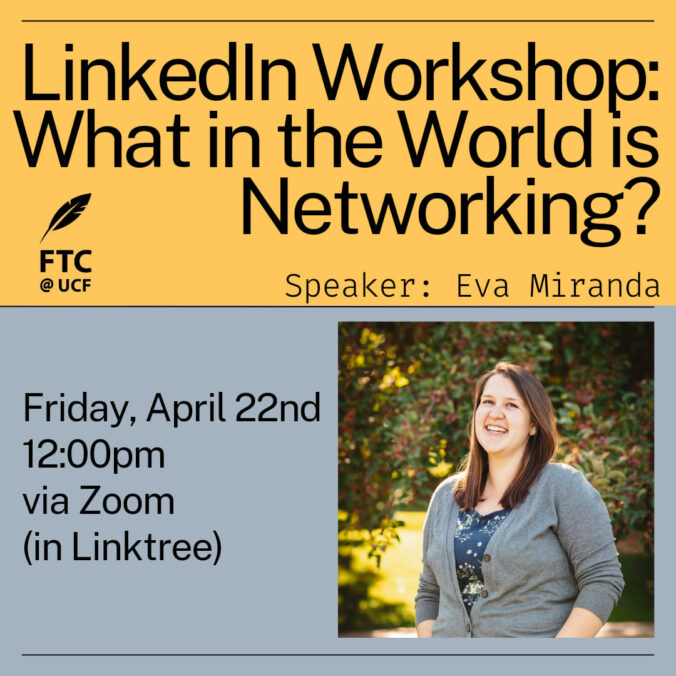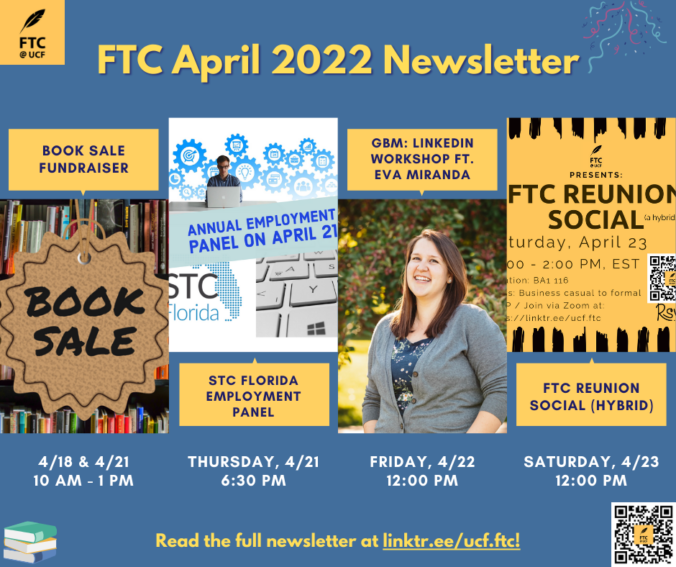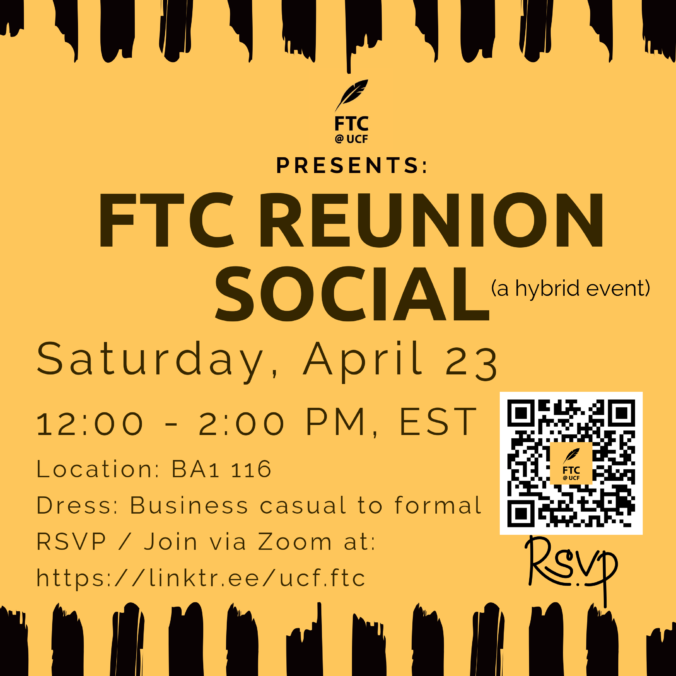Interested in the future of education? Check out STC’s latest Memo to Members, written by our own Joana Donavan!
Author: Ben Bowles (Page 1 of 2)
By Zachary P. Miller
Historian, Future Technical Communicators club at UCF
Picture this. You are meeting up with some old friends to grab lunch. It has been years since you have interacted with each other beyond calls and texts. Fast forward two hours into your hangout, and you are having a great time. Your friends cannot stop checking their phones with glee and laughter. Soon enough, you are introduced to an incredible new social app they are using to stay in contact with one another. You immediately download it from the AppStore and begin creating an account. You fill out all of your credentials as quickly as possible, and head for the create account button. But wait, you have to select that you have read the terms of use and privacy policy to proceed. Well, did you? Have you ever bothered to open the legal documents you effectively sign when hitting the checkmark? The odds are probably not.
In 2017, a Deloitte survey of 2,000 participants found that 91% of people consent to user agreements without reading them. Let’s break it down. When creating an account for Snapchat, each user is required to check a box at the end of a statement that goes something like this: “By tapping Sign Up and Accept, you acknowledge that you have read the Privacy Policy and agree to the Terms of Service.”
The combined total of words that each document contains is 13,766. 200-250 words per minute is a reasonable estimate for an average person living in the United States. However, literacy is still much lower for many people. That being said, it would take an ‘average person 68 minutes to read through the entirety of SnapChats Privacy Policy and Terms of Service. Is this reasonable?
The walls of text that make up user agreements like Snapchat and the simple agreement that is relatively user-friendly in terms of getting an account created are thought-provoking. Who are these agreements really for? In order to answer this question, we must understand the basis of these user agreements.
In most cases, agreements like privacy policies and terms of service are required by law for any business that collects user data. A privacy policy aims to inform users about collecting their data while using a digital service and explain how this data is used. On the other hand, terms of service serve to inform users what the limitations of service are. While terms of service are not necessarily required by law, they are essential to any service or platform that hopes to avoid liability and enforce a set of rules on its users.
Obviously, these agreements should do more than just put companies in the clear for utilizing personal data and controlling their users. When first using a digital service, it is required that you check a box or hit a button that allows you to proceed to use the service. Agreeing to privacy policies and terms of service with a simple click of a button is accessible to the user, no doubt. Yet, these agreements are often in a form that is not designed with user comprehension in mind. Anyone who has looked at a privacy policy can agree that it is no simple task to review before signing, especially when you are eager to solve a problem that the service you are using satisfies.
To ensure transparency between companies and their users, it is essential to take a human-centered approach to design the agreements that allow companies to succeed. More technical communicators need to design solutions that can convey critical points of user agreements rather than discouraging users from even attempting to read the agreements in the first place. Do you read them?
For the time being, I have collected some options for users to consider if faced with the problem we have outlined around user agreements.
- First off, using a Virtual Private Network (VPN) can make it hard for third parties to track and capture your data. This bypasses the issue with the comprehensibility of user agreements by encrypting your data and disguising your identity.
- Users can also gain skills in identifying keywords within agreements that can give insights into what they relinquish with the acceptance of privacy policies and terms of service. The keywords to look out for will tell you what information the app or website collects, how long it keeps this data, and who they share it with. Keywords include accepting, agree, authorize, retain, and third parties.
- Companies might make their agreements more comprehensible through user experience research and design. Simply understanding user expectations, redesigning layouts, including visuals, and writing for comprehension to a broad audience can make a vast difference for users.
- Taking a step further, outside efforts to create a solution that analyzes and presents key points from privacy policies and terms of service have been made. Research in machine learning offers solutions that can match the expertise of privacy policy experts and “Open[s] opportunities for other innovative privacy policy presentation mechanisms, including summarizing policies into simpler language. It can also enable comparative shopping applications that advise the consumer by comparing the privacy aspects of multiple applications they want to choose from” (Harkous).
- This technological mitigation culminates in initiatives and tools that allow for a clear understanding of what data each website or application harvests from its users. The initiative titled Terms of Service; Didn’t Read (ToS; DR) seeks to help fix the “biggest lie on the web” that almost no one reads privacy policies and terms of service before agreeing.
We’ve got one last guest speaker meeting for you all! Eva Miranda is the president of the STC Rocky Mountain Chapter, and she recently volunteered to come present with FTC. The topic will be LinkedIn and best practices for networking. She will discuss how to put together a thoughtful profile and how to tailor it to your audience, particularly as students and new professionals. She will also be available for questions during the workshop.
Please note that this meeting will start earlier in the day than our usual general body meetings, at 12:00 PM Eastern Time next Friday, April 22. It will be recorded and sent out afterward as well. We hope you can join in!
Connect with Eva on LinkedIn here: https://www.linkedin.com/in/eva-miranda-23a570111
Join on Zoom: https://linktr.ee/ucf.ftc
Our club is running a book sale at the UCF Student Union Patio this week! Day 1 was yesterday, April 18, and we’re returning for one more round this Thursday, April 21. It is in partnership with Sigma Tau Delta English Honor Society. All sales are donation-based, so you can name your own price. Come by to pick up a book, hang out, or help us run the table! Proceeds will be split between our two clubs, with some going to charity and some going to supporting our club’s STC Summit trip.
| Hi everyone, Welcome to the April 2022 edition of FTC’s monthly newsletter! We are in the final stretch of the semester now with just one month to go. Stay diligent and reach for the finish! As we end the semester, our club has a few more things up its sleeve for you. Next week we have a book sale fundraiser on campus, one last guest speaker meeting, and our FTC Reunion Social. Each is sure to be a fun time and we hope you can participate! Read on for all the details. Click here if you’d like to read last month’s newsletter as well. If FTC can help you in any way, feel free to reach out to us at ucf.ftc@gmail.com. All the best, John Clement President, Future Technical Communicators |
Get ready for our FTC Reunion Social on Saturday, April 23!
- Date and time: Saturday, April 23 @ 12:00 – 2:00 PM, EST
- Event address: UCF, Business Administration 1, Room 116
- Online location: Zoom (call link will be sent to the RSVP list)
To close off the school year, our club will be hosting a social in celebration of over 20 years of FTC history and all of our graduating members! The event will be hybrid, so it will be hosted in person at UCF but have the option for online attendance as well.
Please fill out our RSVP Form below to let us know if you are interested in attending. If you are a grad or alumni, we invite you to share a few extra items on the form to help us make this event special, whether or not you are able to attend. The event will run from 12pm to 2pm, and we have a few things planned like a presentation, games, and snacks. We can’t wait to see you then!
Get ready for our next GBM this Friday, with a special presentation topic by popular request: Introduction to MadCap Flare, featuring guest speaker Diane Hogan, PhD!
Join us this Friday, March 25th at 6:00pm EST via Zoom: https://linktr.ee/ucf.ftc (edited)








